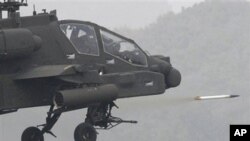WASHINGTON —
The United States said on Tuesday it will deliver 10 Apache attack helicopters to Egypt, relaxing a suspension of aid imposed after Egypt's armed forces ousted President Mohamed Morsi last year and cracked down violently on protesters.
U.S. Defense Secretary Chuck Hagel informed his Egyptian counterpart of the decision to lift a hold on delivery of the helicopters, which would support Egypt's counterterrorism operations in the Sinai Peninsula, the Pentagon said.
“We believe these new helicopters will help the Egyptian government counter extremists who threaten U.S., Egyptian, and Israeli security,” Pentagon spokesman Rear Admiral John Kirby said in a statement, recounting Hagel's conversation with Egyptian Defense Minister Colonel Sedki Sobhi.
Behind the move was a decision by U.S. Secretary of State John Kerry to certify to Congress that Egypt met key criteria allowing Washington to free up some aid, suspended last year after Egyptian authorities used violence to put down protests after the military ousted Morsi in July.
Those criteria included Egypt “upholding its obligations under the Egypt-Israel Peace Treaty,” the State Department said.
But Kerry noted in a call with his counterpart that he was not yet able to certify that Egypt was taking steps to support a democratic transition.
One U.S. official, speaking on condition of anonymity, said no other military aid beyond the Apaches was being freed up at the moment. That meant that delivery of other hardware, like F-16 fighter jets, remained on hold.
That could send a signal to Egypt ahead of next month's presidential election, which Abdel Fattah al-Sissi, the former army general who deposed Morsi, is expected to win.
In a call with Egypt's foreign minister, Kerry “urged Egypt to follow through on its commitment to transition to democracy - including by conducting free, fair, and transparent elections,” spokeswoman Jen Psaki said.
Kerry also called on Egypt to ease restrictions on freedom of expression, assembly, and the media, she said.
Egypt for decades has been among the largest recipients of U.S. military and economic aid because of its 1979 peace treaty with U.S. ally Israel.
U.S. Defense Secretary Chuck Hagel informed his Egyptian counterpart of the decision to lift a hold on delivery of the helicopters, which would support Egypt's counterterrorism operations in the Sinai Peninsula, the Pentagon said.
“We believe these new helicopters will help the Egyptian government counter extremists who threaten U.S., Egyptian, and Israeli security,” Pentagon spokesman Rear Admiral John Kirby said in a statement, recounting Hagel's conversation with Egyptian Defense Minister Colonel Sedki Sobhi.
Behind the move was a decision by U.S. Secretary of State John Kerry to certify to Congress that Egypt met key criteria allowing Washington to free up some aid, suspended last year after Egyptian authorities used violence to put down protests after the military ousted Morsi in July.
Those criteria included Egypt “upholding its obligations under the Egypt-Israel Peace Treaty,” the State Department said.
But Kerry noted in a call with his counterpart that he was not yet able to certify that Egypt was taking steps to support a democratic transition.
One U.S. official, speaking on condition of anonymity, said no other military aid beyond the Apaches was being freed up at the moment. That meant that delivery of other hardware, like F-16 fighter jets, remained on hold.
That could send a signal to Egypt ahead of next month's presidential election, which Abdel Fattah al-Sissi, the former army general who deposed Morsi, is expected to win.
In a call with Egypt's foreign minister, Kerry “urged Egypt to follow through on its commitment to transition to democracy - including by conducting free, fair, and transparent elections,” spokeswoman Jen Psaki said.
Kerry also called on Egypt to ease restrictions on freedom of expression, assembly, and the media, she said.
Egypt for decades has been among the largest recipients of U.S. military and economic aid because of its 1979 peace treaty with U.S. ally Israel.





